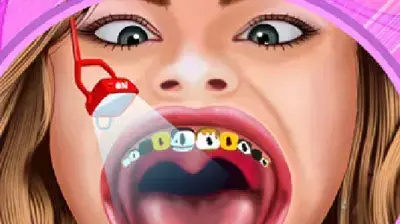Things the dentist can tell about you just by looking at your mouth/@thatdentalgal_
The memorable scene of
Dustin Hoffman
in the dentist's chair in the iconic movie "The Marathon Man", when the monstrous doctor (who turns out to be a Nazi, played by
Lawrence Olivia
) drills his teeth mercilessly, and Hoffman innocently asks - "Is it safe?"
And the Nazi doctor replies: "You don't understand how much" perhaps expresses more than anything else the inherent fear that almost every one of us has of the dentist.
This is why occasionally people who come to the clinic, see the treatment chair and the drills next to it - and faint.
In dental schools, the future doctors are taught what to do in these cases.
The legs are raised towards the head, and in not many seconds the fainting person comes back to himself.
An elderly woman came to my clinic for treatment, and a little before we started, probably because of the stress and anxiety she had, she felt pressure in her chest.
Within minutes an ambulance evacuated him for an urgent examination at the hospital.
In most cases of this type, it is anxieties that are not treated.
But there are less common cases such as allergies to substances that the dentist uses during treatment.
These cases are more dangerous and with incorrect treatment or repeated treatment - may end in death.
In the case of a severe allergy, there is a drop in blood pressure.
The most correct treatment in this case is an immediate injection of adrenaline.
A case like this has never happened to me in the clinic, but I always have an adrenaline syringe at hand - just in case.
That is why it is also very important to be in eye contact with the patient throughout the treatment and not to take your eyes off him.
It could end up in the emergency room.
Excessive fear and anxiety of the dentist/walla!
fun
Some people are sensitive to adrenaline, which is found in the numbing agent, whose function is to constrict blood vessels in the treated area and prolong the duration of numbness.
In such cases those people will react with an accelerated pulse, which may be dangerous.
There is also an allergy to certain materials we work with, such as the acrylic material from which a temporary crown is made.
It is always important to verify these sensitivities before treatment and to use alternative materials.
There are also cases that suddenly, during treatment, the patient experiences a drop in sugar levels, apparently as a result of fear and anxiety.
I always have glucose solutions in the drawer ready to use.
As soon as the patient takes them, he immediately returns to himself.
A powerful solution to pain
A revolutionary pain treatment technology has been approved by the FDA for home use
In collaboration with Solio
When a patient accidentally swallows a needle
Additional stressful cases may happen due to carelessness on the part of the attending physician.
In root canal treatments or during implant treatment, we work with quite a few sharp and small instruments, which can easily slide into the throat.
This is why doctors use these treatments with a rubber dam, a kind of rubber sheet that is mounted on the lower jaw, which separates the treatment area from the oral cavity and the swallowing area.
Thus, in the event that an instrument or part falls during the treatment, it does not reach the throat.
I have heard of quite a few cases of doctors who did not use a rubber dam, and the patient without small metal parts, tooth parts or in other cases also thin and long needles that we use in root canal treatments.
Swallowing needles is obviously dangerous and such cases sometimes require invasive surgery to remove them.
But let me reassure you.
The cases described here have happened in the past and are likely to happen in the future, but they are rare.
With dental treatment by a qualified and experienced doctor, you should not experience any of these cases.
And even if something happened - every problem always has a solution, so no pressure, eh?
Dr. Avi Eyal is a dentist specializing in oral rehabilitation treatments and dental aesthetics
More on the same topic:
Teeth
Dental care
Root Canal

